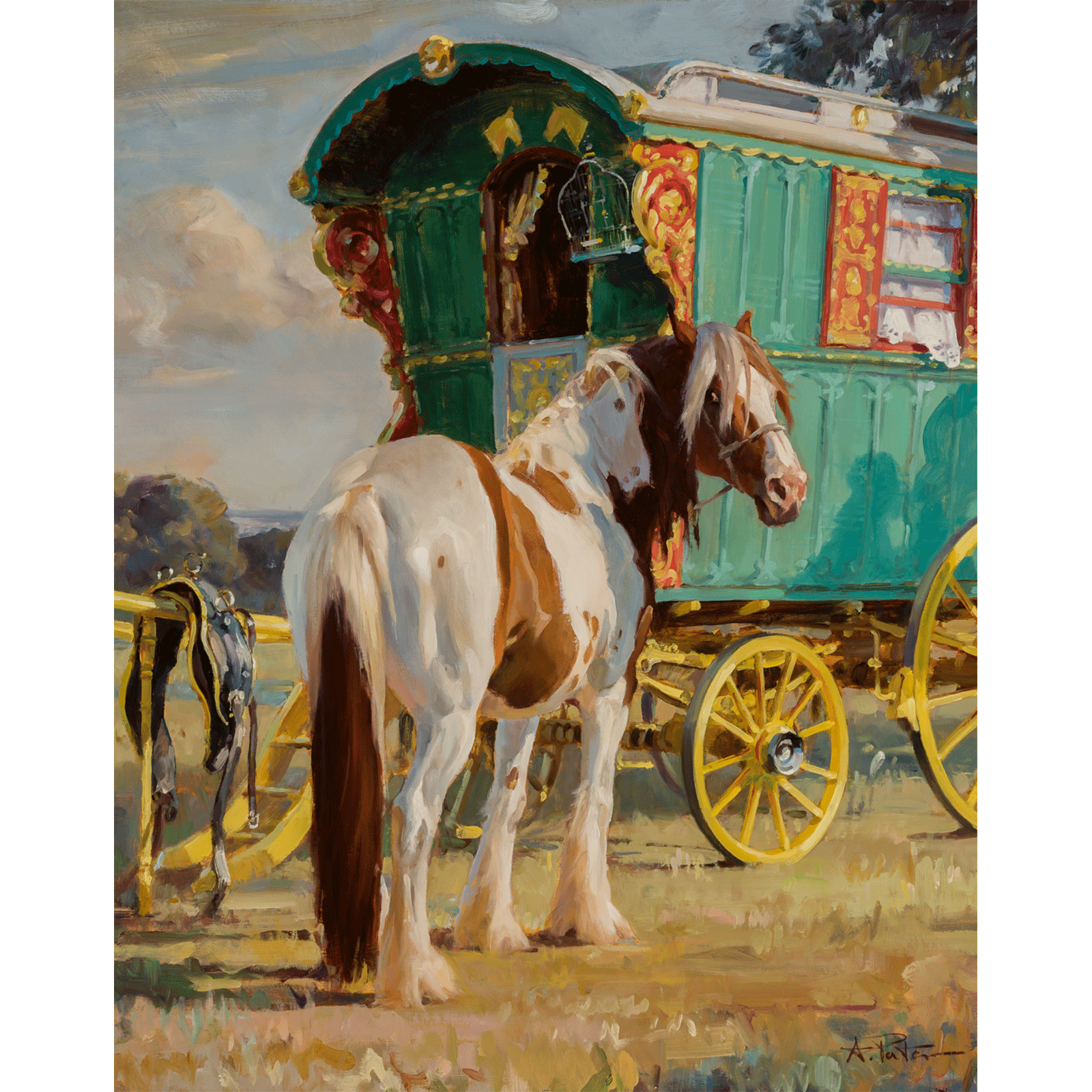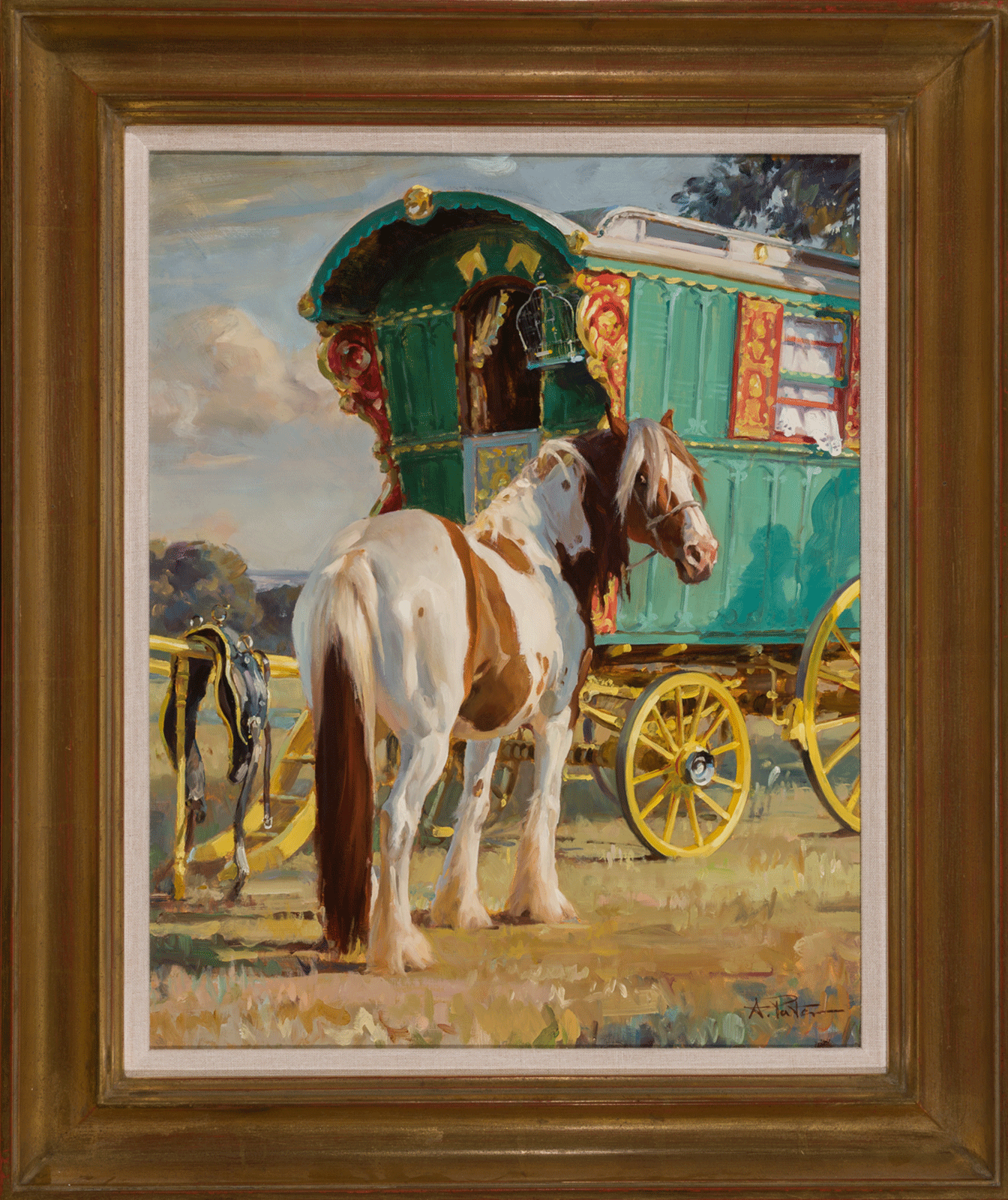2020 Fine Sporting Art, American Paintings, and Sculpture
159| Andre Pater (Polish/American, b. 1952)
Caravan To Appleby Fair
$40,250.00
The Appleby Horse Fair is an annual gathering of Gypsies and Travellers in the town of Appleby in Westmoreland, England. Traditionally held in early June, the largest such fair in Europe draws British, Irish, and Scottish Romanichal travelers in traditional caravans and campers to the market town . Originating from a charter issued by James II in 1685, the fair traces its roots to two separate events: the medieval borough fair held at Whitsuntide until 1885 and the New Fair, an unrecognized event held on Gallows Hill beginning in 1775. A means for sheep and cattle drovers as well as horse traders to sell their stock, the fair by the 1900s had evolved into a major event.
The fair is not organized by an individual group or specific entity, but a ?shera? or head Romani is appointed to oversee the technical aspects and to serve as a liaison with local authority. Activities take place predominantly on Fair Hill and Market Field while horse trading occurs on what is known as the flashing lane. Horses are shown by trotting up and down at speed. A large majority of the horses are stationed in the town center beside the River Eden, where they are ridden directly into the river to be washed and often tied up across from the local pub. Apart from the horses one can find fortune-tellers, palm readers, and assorted vendors of merchandise traditional to the traveller groups.
Oil on canvas, 20" x 16"
$30000. - $50000.
The Appleby Horse Fair is an annual gathering of Gypsies and Travellers in the town of Appleby in Westmoreland, England. Traditionally held in early June, the largest such fair in Europe draws British, Irish, and Scottish Romanichal travelers in traditional caravans and campers to the market town . Originating from a charter issued by James II in 1685, the fair traces its roots to two separate events: the medieval borough fair held at Whitsuntide until 1885 and the New Fair, an unrecognized event held on Gallows Hill beginning in 1775. A means for sheep and cattle drovers as well as horse traders to sell their stock, the fair by the 1900s had evolved into a major event. The fair is not organized by an individual group or specific entity, but a ?shera? or head Romani is appointed to oversee the technical aspects and to serve as a liaison with local authority. Activities take place predominantly on Fair Hill and Market Field while horse trading occurs on what is known as the flashing lane. Horses are shown by trotting up and down at speed. A large majority of the horses are stationed in the town center beside the River Eden, where they are ridden directly into the river to be washed and often tied up across from the local pub. Apart from the horses one can find fortune-tellers, palm readers, and assorted vendors of merchandise traditional to the traveller groups.
The Appleby Horse Fair is an annual gathering of Gypsies and Travellers in the town of Appleby in Westmoreland, England. Traditionally held in early June, the largest such fair in Europe draws British, Irish, and Scottish Romanichal travelers in traditional caravans and campers to the market town . Originating from a charter issued by James II in 1685, the fair traces its roots to two separate events: the medieval borough fair held at Whitsuntide until 1885 and the New Fair, an unrecognized event held on Gallows Hill beginning in 1775. A means for sheep and cattle drovers as well as horse traders to sell their stock, the fair by the 1900s had evolved into a major event. The fair is not organized by an individual group or specific entity, but a ?shera? or head Romani is appointed to oversee the technical aspects and to serve as a liaison with local authority. Activities take place predominantly on Fair Hill and Market Field while horse trading occurs on what is known as the flashing lane. Horses are shown by trotting up and down at speed. A large majority of the horses are stationed in the town center beside the River Eden, where they are ridden directly into the river to be washed and often tied up across from the local pub. Apart from the horses one can find fortune-tellers, palm readers, and assorted vendors of merchandise traditional to the traveller groups.
To Leave An Absentee Bid, Please Enter An Amount Below


